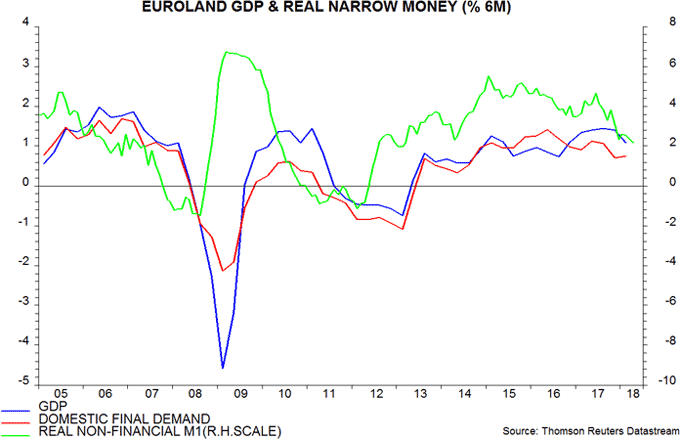Euroland GDP details downbeat
A post in March argued against consensus positivity about Euroland economic prospects, noting that domestic final demand had already slowed while net export strength was likely to fade as a result of euro appreciation and falling global momentum. GDP expenditure details for the first quarter released today are consistent with this assessment. Monetary trends suggest further weakness in domestic final demand while net exports may continue to struggle without a much more significant fall in the exchange rate.
The GDP report confirmed a 0.4% increase in the first quarter, down from 0.7% in the fourth quarter of 2017. Domestic final demand – i.e. consumption and fixed investment – rose by 0.35%, while net exports subtracted 0.15 percentage points (pp) from the quarterly GDP change. Total final demand, therefore, expanded by just 0.2%, down from 0.8% in the fourth quarter. GDP growth was supported by a 0.2 pp contribution from inventories – stockbuilding rose to a nine-quarter high.
Euroland narrow money trends lead GDP developments but appear to have an even closer relationship with domestic final demand. Two-quarter demand growth peaked as long ago as the second quarter of 2016, following a peak in six-month real narrow money growth in January 2015 – see chart. The two-quarter demand change recovered slightly in the first quarter, as expected here in March on the basis of a temporary revival in narrow money trends in the first half of 2017. The subsequent fall in real narrow money growth to a five-year low in April suggests that domestic final demand will slow further into late 2018 / early 2019.

Net exports are unlikely to take up the slack against the backdrop of an expected global economic slowdown and a current effective exchange rate level still 3% above its 2017 average (Bank of England measure).
The rise in inventories in the first quarter, meanwhile, was probably involuntary and fits with the view here that the global stockbuilding (Kitchin) cycle is approaching a peak and will act as a drag on economic growth in late 2018 / 2019.

Reader Comments